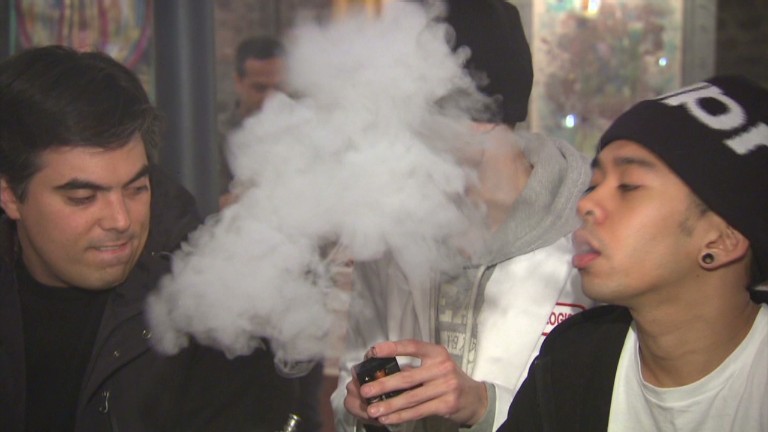The number of children under 6 poisoned by nicotine in e-cigarettes rose by nearly 1,500% between 2013 and 2015, and one child died, according to an analysis of calls to the National Poison Data System published in the journal Pediatrics.
More than 90% of the children swallowed the nicotine-laced liquid, known as e-juice, that is smoked inside e-cigarettes. Nearly half of the exposed children were under the age of 2.
The number of children exposed to e-cigarette products each month rose from 14 in January 2012 to 223 in April 2015.
“On average, every three hours, a poison center receives a call about a young child exposed to an e-cigarette or liquid nicotine,” said the study’s senior author, Dr. Gary Smith, director of the Center for Injury Research and Policy at Nationwide Children’s Hospital in Columbus, Ohio. “That’s more than seven children each day.”
The numbers of accidental poisonings skyrocketed because of the explosive popularity of e-cigarettes, Smith said. Their use among U.S. adults doubled between 2010 and 2013, and tripled among high school students from 2013 to 2014. That trend continues: Total sales are predicted to top $10 million by 2017.
E-cigarette exposure is more harmful, analysis finds
The study looked into calls about exposure to nicotine and tobacco products in children under 6 between January 2012 and April 2015. It compared e-cigarettes with tobacco cigarettes and other tobacco products, mostly snuff and chewing tobacco.
“This is the first comprehensive multiyear study of exposures among young children using a national database,” Smith said. “Over the 40-month study period, more than 17,500 children were exposed to cigarettes, and more than 4,000 children were exposed to e-cigarettes or liquid nicotine.”
While the number of children who came into direct contact with e-cigarettes was much smaller, the outcomes were more serious. Children in contact with e-cigarettes were 5.2 times more likely to be admitted to a health care facility and 2.6 times more likely to have a severe reaction than those exposed to traditional cigarettes.
“Liquid nicotine is very concentrated and easily absorbed into the body,” Smith explained, “and can cause serious poisoning and death among young children after even small doses.”
Once nicotine enters the body, it rapidly affects the heart and circulation system, as well as the gastrointestinal and nervous systems.
“In this study,” Smith said, “children exposed to e-cigarettes and liquid nicotine more commonly experienced severe clinical effects, such as seizure, coma and respiratory arrest, than children exposed to cigarettes.”
Easy access, enticing packaging and flavors
Smith said the analysis discovered that children were often able to get to the products because they were improperly stored or left out in the open — in some cases during use by an adult.
“We take this very seriously,” said Ray Story, founder and CEO of the Tobacco Vapor Electronic Cigarette Association. “We already tell users to refill their devices away from children and store all e-cigarette products in a safe, childproof place. These are irresponsible adults who are not handling the product with care.”
“This is not primarily a parenting problem,” Smith said. “The best parent in the world cannot watch their child every second. Rather, this is another example of a highly dangerous product being introduced into the places where young children live and play without adequate regard for child safety.”
To a child, the small, colorful bottles in which e-juice is sold can be enticing. It comes in a rainbow of colors and flavors, mimicking candy and desserts: bubble gum, gummy candy, marshmallow, chocolate, fruit flavors, even glazed doughnut and pie crust flavors.
Critics of the industry have called for manufacturers to limit or change flavors, packaging and labeling so that they are less appealing to youngsters. Story said his association has advocated since 2009 for a changes in the law that would require age verification and restrict sales to minors, as well as childproof bottles.
But as for limiting choice? “Nicotine without flavoring is odorless and tasteless. This is an adult product, and therefore the adult has a right to choose his or her flavor,” Story said. “We strive to provide the adult user with a vastly less harmful alternative to conventional tobacco. We hope that these adults handle the products with care.”
“It is unacceptable,” Smith said, “that children are being rushed to emergency departments in coma, with seizures or breathing failure, and dying. Child safety should be put first.”
Concerns over a mostly unregulated industry prompted the Food and Drug Administration to announce that it is extending its authority over e-cigarettes and other tobacco products like hookahs and cigars. However, in its final rule (PDF), the FDA declined to limit flavorings, saying it would address the issue in the future.
Parents and caregivers can protect their children, Smith said, by following these tips:
Store e-cigarettes and refill products where children cannot see or reach them; in a locked location is best.
Use and refill alone. Do not use e-cigarettes around children. Because children want to imitate adults, using e-cigarettes and refilling them with children nearby could lead to dangerous exposure.
Store the national Poison Help Line number (1-800-222-1222) in your cell phone and post it near any home phones. Call it in case of accidental exposure.
